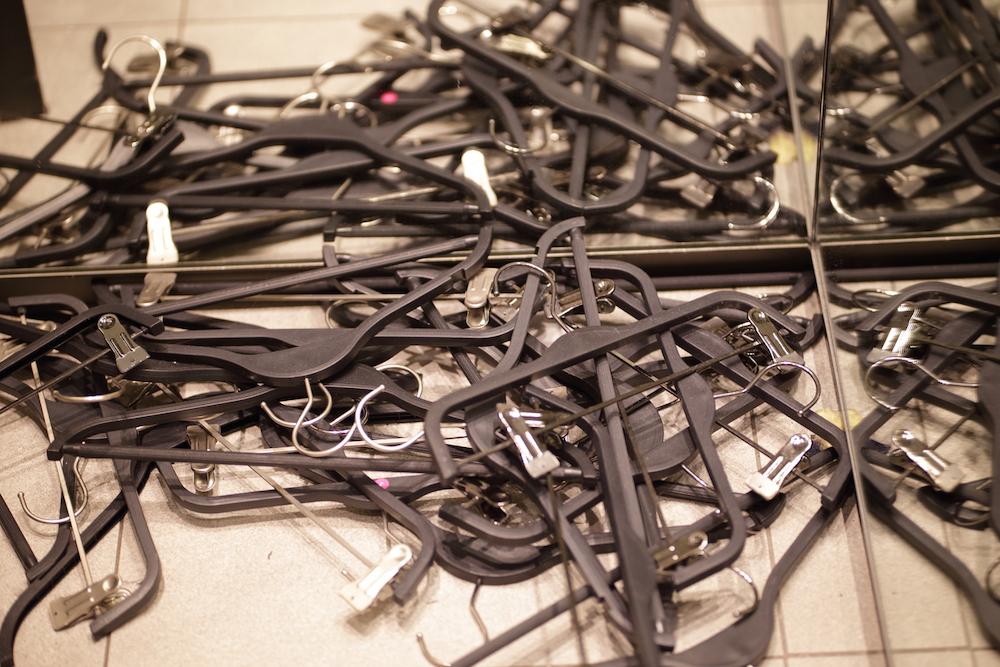Billions of Plastic Hangers Are Produced Each Year. Are They Recyclable?
Here's what to do with those pesky hangers.
Published Feb. 23 2024, 1:36 p.m. ET

Much of the focus on the fashion industry’s tremendous amount of waste surrounds the garments themselves, but there's another factor in the equation that’s often overlooked: plastic hangers. It’s estimated that as much as 85 percent of textile waste in the U.S. is headed for the landfill — oftentimes, along with the hangers produced to display them.
Recycling bottles and food containers has become a routine part of our daily lives, but yet, recycling this other common household item has not. So, why are so many hangers going to waste? Are plastic hangers even recyclable, and if so, how easy is it to do so? Let’s take a closer look at how recyclable plastic hangers actually are, as well as their counterparts, wooden and wire hangers.

Are plastic hangers recyclable?
Many consumers equate whether something is recyclable with whether the item can go in the curbside recycling bin and be regularly picked up by a waste management company. When it comes to plastic hangers, no, they cannot be recycled curbside (with very few exceptions). However, some of them can be recycled, but it’s not easy for consumers to do so.
This is because some hangers are mixed with metal clips and parts to hold pants, towels, or dresses, while others are made with many different types of plastics blended in. When hangers are made of multiple plastic types, they cannot be recycled because the plastics are unable to be separated, per The Daily Mail. The metal parts also make them difficult to recycle.

Even if a hanger is made of just one type of plastic, unlike bottles and containers that are numerically labeled with the type of plastic they’re made from, the material a hanger is created from cannot be easily identified. That means the majority of hangers are headed for landfills, where they can leach toxic chemicals like BPA into the soil and groundwater.
It’s estimated that 30 to 40 billion garments are imported into the U.S. each year — many of which come with their own hanger, per Fox News. The problem isn’t just in the U.S. either, it’s worldwide. In the U.K., a 2019 study conducted for Arch & Hook, a company that produces sustainable hangers, found that 60 percent of all clothing sold in the U.K. came with a hanger, with an estimated 954 million plastic hangers used each year.
Some companies have individual recycling programs for the garment hangers they use (since they know exactly what type of plastic the products are made from), although many more need to adopt this type of closed-loop system of manufacturing. For example, Target is addressing plastic waste by reusing garment hangers seven or more times before repairing or grinding down broken hangers to make new hangers.
Unfortunately, consumers looking to recycle plastic hangers don’t have many viable options, but they can try donating them to local thrift stores, homeless shelters, nursing homes, or theaters (for costumes). Other options include giving them away on Buy Nothing Facebook groups, Freecycle, and Craigslist, or, you can get creative and search for upcycling ideas and plastic hanger crafts.

Are wire hangers recyclable?
Plastic hangers aren’t the only problem! According to an article by Vox published in 2020, the U.S. Department of Commerce estimates that around 200 million pounds of steel generated from about 3.5 billion wire hangers ends up in landfills each year.
This incredibly high number is because wire hangers can get caught in the machinery at the recycling centers, making them difficult to process, so they typically can’t be recycled in curbside bins. Although some recycling centers are equipped to handle them, they’re far and few between (but it’s worth asking your local municipality).
If you have extras, besides keeping one or two as a backup in case you lock your keys in your car, you can try bringing wire hangers to a local dry cleaner to see if they can reuse them. Or, take them to a local scrap metal recycling center. Lastly, you can find creative ideas at home for those wire hangers!
Are wooden hangers recyclable?
Wooden hangers are also problematic as they are usually mixed with wire hooks. On one hand, they’re more durable than cheap plastic hangers and likely to last much longer, but they’re made from woods like oak, maple, pine, and others that may or may not be harvested sustainably. Although they’re made largely from natural wood, the wood is varnished, so composting facilities likely cannot accept them. Consumers are left with the same options as wire or plastic hangers: Donate them or repurpose them.
With so many problems recycling traditional plastic, wire, and wooden hangers, many people are turning to more sustainable hanger options. These include hangers made from recycled plastic, FSC-certified paper, bamboo, or plant-based bioplastics. However, the best way to reduce the number of new hangers being produced is to avoid them altogether, and instead only shop for clothing — and hangers — secondhand.